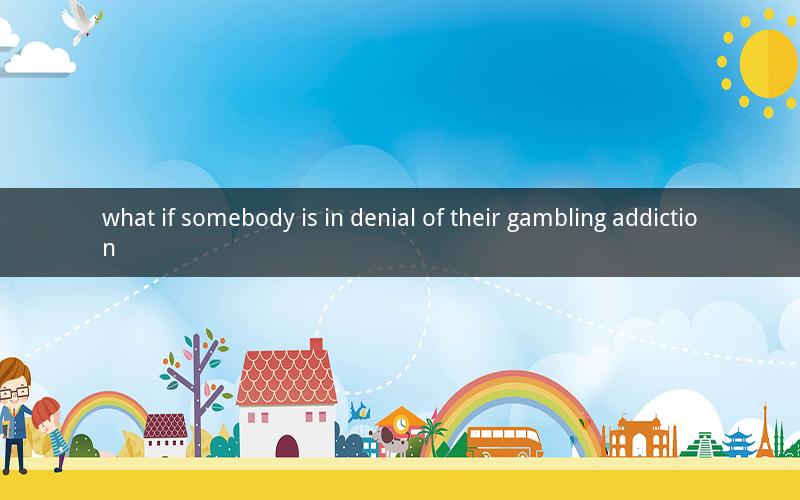
Table of Contents
1. Understanding Denial in Gambling Addiction
2. Signs of Denial in Gamblers
3. The Impact of Denial on Recovery
4. Strategies to Address Denial
5. Professional Help for Gamblers in Denial
6. Support Systems for Gamblers and Their Families
7. The Role of Therapy in Overcoming Denial
8. Case Studies: Gamblers in Denial
9. The Importance of Education and Awareness
10. Conclusion
1. Understanding Denial in Gambling Addiction
Denial is a common defense mechanism that individuals with gambling addiction often employ. It involves refusing to acknowledge the existence of a problem, despite clear evidence to the contrary. When someone is in denial of their gambling addiction, they may exhibit a range of behaviors and attitudes that hinder their ability to seek help and recover.
2. Signs of Denial in Gamblers
Several signs can indicate that a person is in denial about their gambling addiction:
- Blaming others for their problems rather than taking responsibility.
- Minimizing the extent of their gambling behavior.
- Denying the negative consequences of their gambling, such as financial strain or relationship issues.
- Continuing to gamble despite promises to stop or despite knowing it's harmful.
- Displaying a lack of insight into the problem and its impact on their life.
3. The Impact of Denial on Recovery
Denial can have severe consequences for individuals struggling with gambling addiction. It can prevent them from seeking help, delaying their recovery process. Denial can also lead to increased gambling behavior, as the individual may feel that they can control their addiction or that it's not as severe as others believe.
4. Strategies to Address Denial
Addressing denial in gambling addiction requires a multifaceted approach. Here are some strategies that can be effective:
- Encourage open and honest communication about the problem.
- Provide factual information about the nature of gambling addiction.
- Help the individual recognize the consequences of their behavior.
- Offer support and understanding without judgment.
- Suggest professional help or support groups.
5. Professional Help for Gamblers in Denial
Professional help is crucial for individuals in denial about their gambling addiction. Therapists, counselors, and addiction specialists can provide the necessary tools and support to overcome denial. They can also help the individual develop strategies to manage their addiction and improve their quality of life.
6. Support Systems for Gamblers and Their Families
Support systems are essential for both gamblers and their families. Support groups, such as Gamblers Anonymous, can provide a sense of community and understanding. Families can also benefit from counseling and support groups tailored to their needs.
7. The Role of Therapy in Overcoming Denial
Therapy plays a vital role in overcoming denial. Cognitive-behavioral therapy (CBT) can help individuals identify and change negative thought patterns and behaviors associated with their addiction. Other therapeutic approaches, such as dialectical behavior therapy (DBT) and motivational interviewing, can also be effective.
8. Case Studies: Gamblers in Denial
Case studies of gamblers in denial can provide valuable insights into the challenges they face and the strategies that have helped them overcome their addiction. These stories can serve as inspiration and guidance for others struggling with similar issues.
9. The Importance of Education and Awareness
Education and awareness are key to addressing gambling addiction. By understanding the nature of the problem, individuals can recognize the signs of addiction and seek help more readily. Educating the public about gambling addiction can also reduce the stigma associated with the condition.
10. Conclusion
Denial is a significant barrier to recovery for individuals with gambling addiction. By understanding the signs of denial, implementing effective strategies, and seeking professional help, individuals can overcome this obstacle and take the first steps toward a healthier, more fulfilling life.
---
Questions and Answers
1. Q: What are the primary reasons for denial in gambling addiction?
A: Denial in gambling addiction can stem from fear of change, shame, guilt, and the belief that the individual can control their gambling behavior.
2. Q: How can family members help a loved one who is in denial about their gambling addiction?
A: Family members can offer support, encourage open communication, and seek professional help for their loved one. They should also take care of their own emotional well-being.
3. Q: What are some common consequences of denial in gambling addiction?
A: Consequences include financial ruin, relationship problems, legal issues, and mental health challenges.
4. Q: Can therapy help a gambler in denial?
A: Yes, therapy, particularly cognitive-behavioral therapy (CBT), can be highly effective in helping individuals overcome denial and manage their addiction.
5. Q: How can support groups assist gamblers in denial?
A: Support groups can provide a safe space for individuals to share their experiences, learn from others, and gain the strength to seek help.
6. Q: What role does education play in addressing gambling addiction?
A: Education helps individuals recognize the signs of addiction, understand the risks, and seek help more readily.
7. Q: Can medication help treat gambling addiction?
A: While there is no specific medication for gambling addiction, certain medications may be prescribed to treat co-occurring mental health conditions that contribute to the addiction.
8. Q: How long does it take to overcome denial in gambling addiction?
A: The time it takes to overcome denial can vary widely, depending on the individual and the severity of their addiction.
9. Q: What are some signs that a person is ready to overcome their gambling addiction?
A: Signs include acknowledging the problem, expressing a desire to change, seeking help, and taking steps to reduce gambling behavior.
10. Q: Can a person recover from gambling addiction without professional help?
A: While some individuals may recover without professional help, seeking support from therapists, counselors, and support groups can significantly improve the chances of successful recovery.